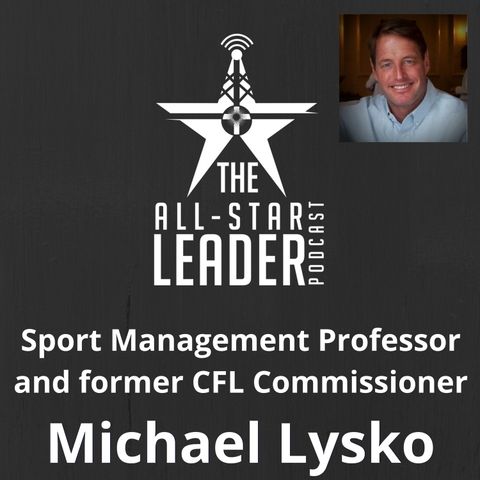Professor Lysko talks about growing up around sports in Canada, careers in agencies and event planning, and the ups and downs of leading the Canadian Football League. Introduction: Hey everyone and welcome to the All-Star Leader Podcast, where together we learn about leadership from the best and brightest, and keep it fun by connecting it to our passion for sports! I’m your host Daniel Hare, and today we are fortunate to be joined by Michael Lysko, the former commissioner of the Canadian Football League, and current Director and a Professor of Practice in the Sport Management Program at Southern Methodist University in Dallas, TX. In addition to those roles Mike has served as a university athletic director, and prior to joining SMU was the Vice President for Marketing and Partnerships at Intersport in Chicago. This is Professor Michael Lysko. Interview Questions: I know I just barely touched on a few points in your impressive bio, so let’s fill in some gaps so our audience can get to know you. Where did you grow up, and what was your early exposure to the sports world? Small town Aylmer, Ontario Canada Sports always part of his life; played hockey, swam, wrestling and football Saturday night sports were big on TV in Canada – following Hee Haw! When did you recognize you wanted a career in sports, and what was the first thing you did about it? As a kid, dream sports career was to play High school assessment and interests said history/political science, but hard to make a career of that. Focused on business and marketing in college. Tell us about some of your early jobs within the sports marketing realm; what did you learn from them? Began with a hockey agency, founded by Bill Waters. Connected to Bobby Orr. You then become the commissioner of the Canadian Football League (And we’ll talk about your tenure there a bit later) You then served as an athletic director; how would you describe the differences between Canadian and American college athletics? 2nd biggest land mass in the world with the population of California. Most are concentrated around Toronto. Up until ’96, there were no college athletics scholarships Level of play in football compares to Group of Five teams (Daniel talking about Canadian university Simon Fraser coming into the NCAA) Makes sense because Canada is so vast, Simon Fraser (Vancouver) is much closer to the U.S. school to its south. What is Intersport Chicago and what did you do for them? Charlie Besser founded Partnered with major networks to produce sports programming (e.g. UA High School football game; Final Four ancillary events) NACDA events Now you’re at the SMU sports management program; tell us about that? Both undergraduate and graduate programs Only program in Dallas-Fort Worth Faculty have at least 15 years in the industry Lots of great major events for students to partner with and get experience (Daniel asked about job market for sports management students) SMU is a small school and there is a 30/semester cap; you have to apply to get into the major program; 70% of applicants are turned down. Focus is on experiential learning, and putting people into position where they can get jobs. 95% to 100% employment rates Once you get in and do good work for seven to 10 years and stay in, you’ll do well Good number of graduates go into sales for their entry-level position Lots of opportunities in agencies which are connected to the major leagues, teams and athletes Dallas-Fort Worth Metroplex is huge and includes Frisco, Plano, Arlington, Irving, etc. Graduate program priority deadline is 2/15 – smu.edu/sportsmanagement; final deadline 4/30 More SMU Materials (Work in Sports; Sports Business Journal Feature; Alumni logos) Not as important which school you’re based in (i.e. business, education), more important to focus on the curriculum Let’s talk a bit about your CFL commissioner tenure and have you teach us a few lessons learned from that experience. First just tell us about the interview process, getting hired, and those first few days on the job. Was in Chicago working and got called by an executive recruiter CFL had issues and had been without a commissioner for five years After the interview with the selection committee he was selected as the guy; but prior to a formal announcement his name was leaked, which sped up the process First few weeks, tried to get a lay of the land; but nothing really added up even though the perception in public was the financials are good He brought in a third party to audit the league’s finances and went about fixing the broken pieces from there What people might not realize is you said those things in the course of litigation following your separation from the CFL in 2002. What would you like to share with us about the circumstances under which you left the CFL, and what do you feel are lessons that we can all learn from what you went through? CFL is a small league; 8 teams Pushed owners to pay back outstanding loans 9/11 – postponed all games in the face of opposition There have been four more commissioners since he left What can we take away about the importance of building trust with colleagues, and how to go about doing that? Be inclusive and listen; servant leadership and doing what’s best for the collective/league Hire people good at what they do and empower them to do their job Honor your word Can’t always find consensus; must do what you think is right based on the information you have at the time Thank Yous/Acknowledgements: Antioch Live/Clear Day Media Group – music More here. Jonathan Davis – production Clint Musslewhite – voice over
show less

